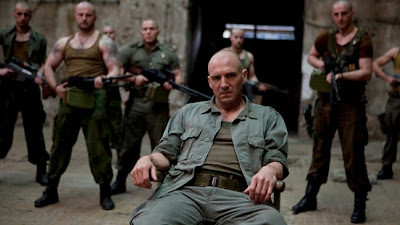He is their god. He leads them like a thing
Made by some other deity than nature,
That shapes man better; and they follow him
Against us brats with no less confidence
Than boys pursuing summer butterflies
Or butchers killing flies...
- WILLIAM SHAKESPEARE, CORIOLANUS
On a relatively warm Friday, before the Golden State decided to turn itself into its best rendition of the United Kingdom capital blessed by fog and drizzly rain, I was lured into the Opera Plaza Cinema by the 95% Rotten Tomatoes review of “Coriolanus.” I am very gullible when it comes to RT opinion but recently I have found myself being more disappointed than grateful. The film, directed by Ralph Fiennes, is based on Shakespeare’s play of the same name that is teleported into the modern portrait of warfare fueled by political rivalry and ambitious propaganda. Caius Martius Coriolanus (Ralph Fiennes) is an admired but widely feared Roman General simultaneously caught in the defense of Rome from foreign invaders, led by Tullus Aufidius (Gerard Butler), and Roman internal political crisis. As he seeks the powerful position of Consul yet fails to gain the trust of the masses due to his excessive pride, the riot erupts resulting in Coriolanus’ banishment from Rome. Enraged by the betrayal of the public he had once defended in war, Coriolanus seeks support of his enemy, Tullus, to extirpate Rome scorning the tears and pleas of the people who were once his allies.
I have waited a week to write this review in hope that once my impression of the film settles and I am able to remove myself from its immediate effect to form an objective opinion. I am afraid to admit that those seven days have done nothing to the clearness of my vision and I am still on the fence about “Coriolanus.” I will start with the positive. The realistic battle scenes deserve a round of applause for the film’s cinematographers –blood-chilling street-fighting and bombings shot on location in Serbia made me feel as if the war broke out today that is exactly how it would look or sadly DOES look, currently, in the Middle East. The mass hysteria portrayed in “Coriolanus” sent shivers down my spine showing how little individual opinion is spared in herd mentality fueled by the propaganda and how much bloodshed can instigate from such chaos.
Ralph Fiennes and Gerard Butler were impeccable in their roles showing wide emotional range. What puzzled me a touch was the homoerotic undertone of both their fighting and “teary” reunions that combined with argumentative yet passionate word spitting (there was a lot of saliva flying around) rendered some scenes comic at best. As to the negative, I would reiterate the excessive dramatism of individual scenes that were pushed beyond realistic human interactions and the difficulty in accessing the language to a common viewer. If you are a Shakespeare buff then the beauty of the language would be a mesmerizing treat, however, those lacking interest in antiquated Shakespearean prose would be left cold and bothered. Besides being a rather love-or-hate movie, “Coriolanus” is a chaotic film overall, juxtaposing the shaky neo-realistic cinematography with pseudo-documentary aesthetic full of displaced dialogues, overdramatisation and lack of authentic historical context. I disliked Baz Luhrmann’s take on “Romeo and Juliet” and Ralph Fiennes’ “Coriolanus” left me unfazed as well…in other words, Shakespeare is often best left in his own historical time frame.
Ralph Fiennes and Gerard Butler were impeccable in their roles showing wide emotional range. What puzzled me a touch was the homoerotic undertone of both their fighting and “teary” reunions that combined with argumentative yet passionate word spitting (there was a lot of saliva flying around) rendered some scenes comic at best. As to the negative, I would reiterate the excessive dramatism of individual scenes that were pushed beyond realistic human interactions and the difficulty in accessing the language to a common viewer. If you are a Shakespeare buff then the beauty of the language would be a mesmerizing treat, however, those lacking interest in antiquated Shakespearean prose would be left cold and bothered. Besides being a rather love-or-hate movie, “Coriolanus” is a chaotic film overall, juxtaposing the shaky neo-realistic cinematography with pseudo-documentary aesthetic full of displaced dialogues, overdramatisation and lack of authentic historical context. I disliked Baz Luhrmann’s take on “Romeo and Juliet” and Ralph Fiennes’ “Coriolanus” left me unfazed as well…in other words, Shakespeare is often best left in his own historical time frame.




No comments:
Post a Comment